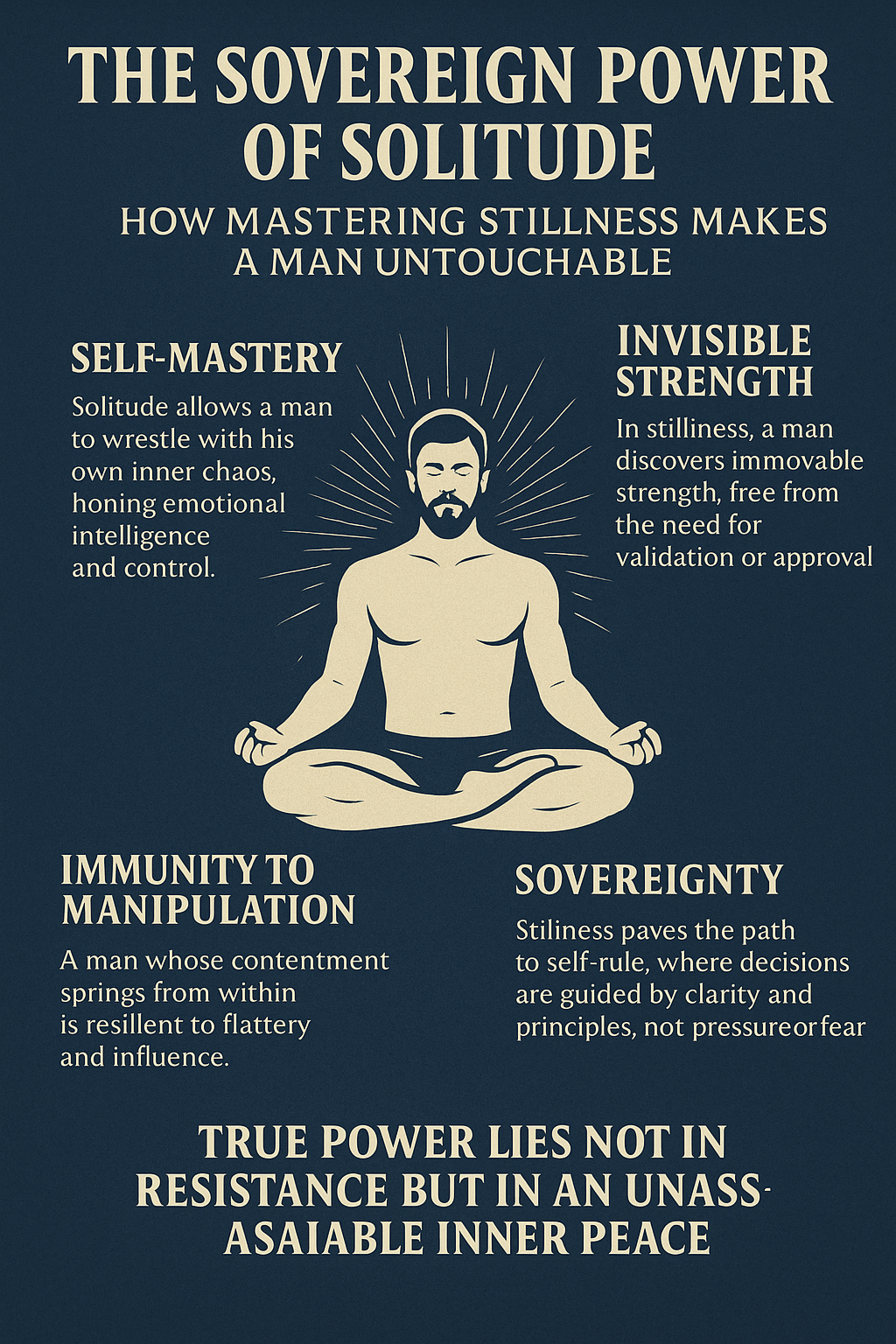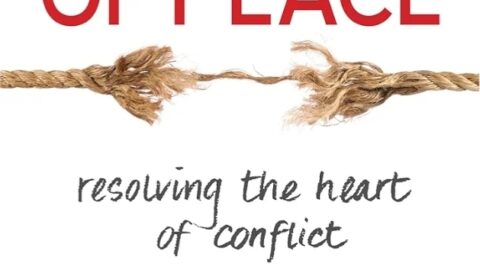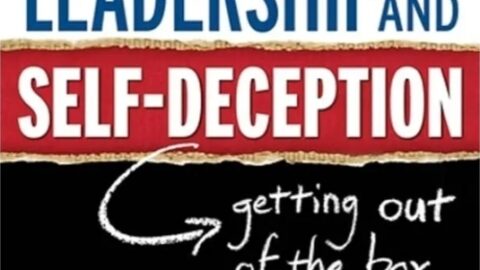Picture this: a man sits alone in a quiet room. Outside, the world spins in chaos—phones buzzing, opinions colliding, everyone sprinting toward the next distraction as if their lives depend on it. But he sits unmoved. To the crowd, this looks like weakness. Isolation. Even failure. Yet the truth is far more unsettling.
As Friedrich Nietzsche once wrote, solitude is the workshop of power. Blaise Pascal warned that nearly every human problem comes from one thing: our inability to sit quietly alone with our own mind. The man who not only endures silence but masters it becomes something rare, something dangerous—not because he seeks control over others, but because he has claimed control over himself.
The Age of Noise
Today’s man can’t go sixty seconds without reaching for a screen. Wake up, check notifications. Commute with a podcast. Eat with YouTube. Every gap filled with someone else’s voice, someone else’s reality. Even the so-called “quiet” types aren’t immune; they fill silence with sports scores, news updates, endless scrolls.
Why? Because silence is a mirror. And most are terrified of what they’ll see reflected back: borrowed beliefs, buried regrets, and a life shaped more by the herd than by their own design. Nietzsche called this fear the refusal to confront the storm within. Pascal saw it as proof that man has lost command of his own mind.
The First Trial: Facing the Storm
When a man first steps into solitude, he doesn’t feel powerful. He feels stripped bare. With no validation, no distractions, the shadows begin to speak—fears long disguised by busyness, regrets smothered under noise. Nietzsche called this stage the desert, where every borrowed value must die.
Most men turn back here. They flee to the comfort of noise. But the one who stays begins to transform. Weakness, once endured, becomes the forge of strength. Solitude becomes a weight room for the mind. Each silent session—whether it’s an artist facing a blank canvas, a fighter training in silence, or an entrepreneur confronting his failures—hurts at first. But over time, the storm bends. The man learns not to run from himself, but to breathe in the storm until it loses its power.
The Workshop of Power
From this crucible, solitude evolves into creation. Nietzsche called it the will to power—not the domination of others, but the mastery of self so complete that the environment bends to the force of one’s inner strength.
This is where great works are born. The painter spending endless nights alone with his canvas. The martial artist drilling movements in silence. The strategist mapping a future no one else can yet see. The world calls solitude inactivity, but in truth it is the most decisive workshop of all.
Pascal described this stage as the building of an inner citadel. Each stone laid through discipline, clarity, patience, and skill. When storms arrive, this citadel does not sway.
Precision Over Noise
But power without direction is only noise. True mastery lies in stillness that can act with precision. The man who has mastered solitude becomes like a captain in a storm—calm, deliberate, waiting for the exact moment to act. Leaders like this aren’t the loudest. They’re the ones whose silence commands a room.
This presence isn’t charisma or luck. It’s the byproduct of deep self-mastery. He is no longer reactive. He chooses his rhythm, his battles, his pace.
Real-World Sovereignty
In business, he isn’t driven by fear of missing out. He waits, studies, and strikes only when the move is decisive.
In relationships, he isn’t needy or desperate for attention. His lack of need makes him magnetic.
In creativity, he doesn’t chase applause. He builds cathedrals that last.
This independence makes him untouchable. Entire systems—politics, commerce, social validation—rely on men who need. The man who doesn’t need cannot be controlled.
The Sovereign Individual
Nietzsche would call him the sovereign individual—a man whose values are entirely his own. Pascal would see him as the master of the storm, able to be at peace anywhere. He doesn’t resist the crowd. He can move among it without ever losing himself. And that makes him dangerous.
Not dangerous to himself, but dangerous to the world built on dependency. Because his freedom cannot be bribed, bullied, or bought.
The Discipline of Solitude
But mastery must be maintained. Solitude is a muscle, and if neglected, it withers. Pascal warned against slipping back into distraction. Nietzsche insisted self-overcoming is a lifelong ascent.
The practice can be simple yet brutal:
- 7 minutes of silence each morning—no phone, no music, just your thoughts.
- 7 days without social media—to feel what silence reveals.
- 7 weeks with one uninterrupted hour daily devoted to a project only you care about.
At first, the mind will scream for noise. Sit anyway. This is where the storm begins to bow.
Conclusion: Master Yourself, Master the World
The man who rules himself through solitude is not loud, not flashy, not even rebellious. He is free. Free from fear, free from need, free from control. And because he has mastered the storm inside, he can walk into any storm outside and remain sovereign.
As Pascal would say, he has broken the tyranny of distraction. As Nietzsche would say, he has become who he truly is. And that combination is the highest form of power—the quiet, unshakable kind that the world cannot touch.
Final Word: If you can sit alone and rule yourself, you can walk anywhere and rule the world.
Here’s a point-by-point breakdown of the transcript:
1. Opening Image
- A man sits alone in solitude, “ruling it like a king.”
- Contrast: chaos outside (phones, distractions, constant movement) vs. his stillness.
- Society misinterprets stillness as weakness or isolation.
2. Philosophical Anchors
- Nietzsche: solitude as the “workshop of power.”
- Pascal: human problems stem from the inability to sit quietly alone.
- The man who masters silence controls his inner storm → source of unmatched strength.
3. Critique of Modern Distraction
- Today’s man fills every gap with external noise (notifications, podcasts, music, videos).
- Even “quiet men” use constant consumption to avoid silence.
- Silence is a mirror, reflecting fears, regrets, and borrowed beliefs → most flee from it.
4. The Cost of Avoidance
- Man who can’t sit still has surrendered before the real fight begins.
- Loss of self-command = handing power to others.
- Key idea: If you can’t control your attention, someone else does.
5. First Stage of Solitude
- Solitude initially feels like weakness, not power.
- Stripped of validation, a man confronts buried regrets, fears, doubts.
- Nietzsche’s metaphor: “the desert,” where old values die.
- Most men retreat here, but the strong endure.
6. Forging Through Weakness
- Solitude as a mental weight room.
- Early sessions hurt: artists, fighters, entrepreneurs facing the silence of their craft.
- Over time, thoughts lose power to terrify → man learns to breathe in the storm.
- Weakness becomes the forge of strength.
7. From Void to Workshop
- Solitude shifts into creation: the “will to power.”
- Strength here is about self-mastery, not controlling others.
- Great works emerge from long solitary focus (painters, martial artists, strategists).
- Pascal’s “citadel within” is built stone by stone: discipline, patience, clarity.
8. Precision Over Noise
- Strength must be directed.
- Most confuse busyness with progress.
- True mastery = calm, deliberate action (captain in a storm).
- Leaders who move with precision change everything.
9. Real-World Applications
- Business: patient, strategic, avoids FOMO.
- Relationships: free of neediness, magnetic presence.
- Creativity: builds timeless work, not crowd-pleasers.
- This freedom makes him “untouchable” → mastery inside precedes mastery outside.
10. Danger to Systems of Control
- Entire systems (business, politics, social approval) rely on dependence.
- A self-sufficient man can’t be controlled → seen as dangerous.
- He doesn’t rebel loudly, he simply is free.
11. Sovereign Individual
- Nietzsche: the “sovereign individual,” with values of his own.
- Pascal: ultimate mastery = peace anywhere.
- This man can walk among crowds without losing himself.
12. Maintenance of Mastery
- Solitude is a muscle that decays without practice.
- Nietzsche: self-overcoming is lifelong.
- Pascal: warns against drifting back into distraction.
- Challenge: 7 minutes daily solitude, 7 days offline, 7 weeks of focused personal work.
13. Final Synthesis
- Solitude leads to:
- Pascal’s calm in storms (command of mind).
- Nietzsche’s self-overcoming (power forged through the desert).
- Together, they create a man who rules himself → and therefore cannot be ruled by others.
Core Message:
The man who masters solitude becomes dangerous not through rebellion, but through independence. His freedom from need, validation, and distraction makes him ungovernable, creative, and magnetic — a sovereign force in a world built on dependency.







